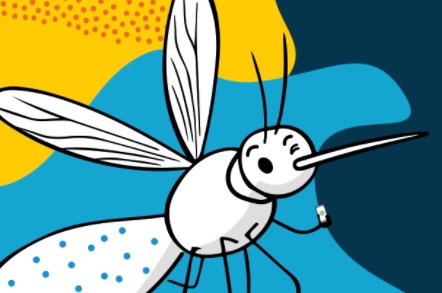Study confirms effectiveness of Wolbachia Method against dengue fever
16/06/2021
By: Guilherme Costa (WMP Brasil)
Published in The New England Journal of Medicine, the results of a randomized controlled trial (RCT) showed a reduction of 77% of cases of dengue fever in areas that received the Aedes aegypti mosquito with Wolbachia, in Yogyakarta, Indonesia. This is the same technique employed in Brazil (the Wolbachia method), an initiative led by Fiocruz in the country.
 The study also reveals an 86% reduction in hospitalizations in areas treated with Wolbachia, proof that the effectiveness of the method is equivalent for all four serotypes of dengue fever. “These results show how Wolbachia can be a new method to control dengue fever, a method that is safe, sustainable and effective, exactly what the global community needs”, highlights Cameron Simmons, a researcher of the University of Monash, in Australia, one of the coordinators of the study.
The study also reveals an 86% reduction in hospitalizations in areas treated with Wolbachia, proof that the effectiveness of the method is equivalent for all four serotypes of dengue fever. “These results show how Wolbachia can be a new method to control dengue fever, a method that is safe, sustainable and effective, exactly what the global community needs”, highlights Cameron Simmons, a researcher of the University of Monash, in Australia, one of the coordinators of the study.
According to Adi Utarini, researcher at the University of Gadjah Mada, Indonesia, and co-coordinator of the study, “the country has more than 7 million cases of dengue fever every year. This experimental success allows us to expand our work throughout the city and in the surrounding urban areas. We believe in a possible future in which Indonesian citizens will be able to live free from dengue fever”.
Wolbachia Method in Brazil
In Brazil, the Wolbachia Method is led by Fiocruz, financed by the Ministry of Health and with the support of local governments. The actions were kick-started in Rio de Janeiro and Niterói, both in the state of Rio de Janeiro, in an area with 1.3 million inhabitants. In Niterói, preliminary data already point to a reduction of 77% of dengue fever and 60% of chikungunya cases in the areas that received the Aedes aegypti with Wolbachia, when compared with areas that did not.
The project is currentlyl being expanded to Campo Grande (in the state of Mato Grosso), Petrolina (in the state of Pernambuco) and Belo Horizonte (capital of the state of Minas Gerais). In Belo Horizonte, another clinical trial, similar to the one led by WMP in Indonesia, is currently under way. The city will be the first in the Americas to follow cases of dengue fever, zika and chikungunya by means of a randomized controlled trial (RCT), in conjunction with the Wolbachia Method.
The RCT included between 50 and 60 children per cluster, between 6 and 11 years old (from 1st to 3rd year of school), enrolled in municipal public schools in Belo Horizonte, selected to participate in the project. “We expect that in up to four years, which is how long the study will last, it will be possible to get ot know the impact of the Wolbachia Method to control arbovirus diseases in Belo Horizonte”, explains Luciano Moreira, Fiocruz researcher and leader of the Wolbachia method in Brazil.
More information on the Wolbachia method is available here.


